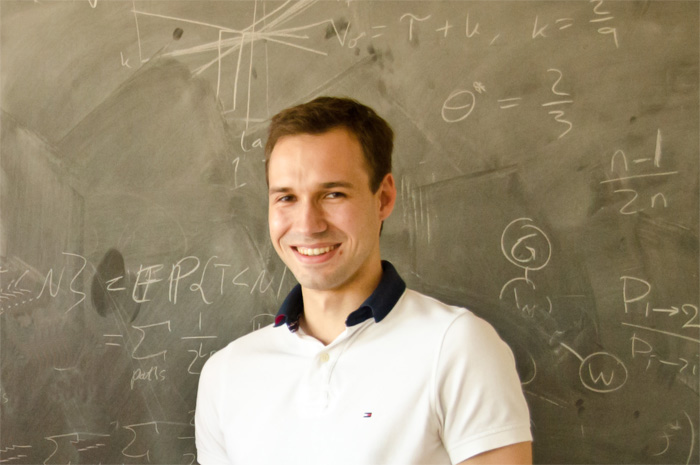Alumni Profile: Johannes Reiter

WHERE?
- STANFORD UNIVERSITY, STANFORD, USA
AREA OF WORK
MY RESEARCH LIES AT THE INTERFACE OF COMPUTER AND BIOMEDICAL SCIENCES AND FOCUSES ON THE STOCHASTIC PROCESSES UNDERLYING EVOLUTION. I DEVELOP COMPUTATIONAL METHODS TO LEARN FROM LARGE-SCALE BIOLOGICAL DATA SETS AND BUILD MATHEMATICAL MODELS TO EXPLAIN OBSERVATIONS ON A MECHANISTIC FASHION.
MOST RECENTLY, I FOCUSED ON INFERRING THE EVOLUTION AND THE SEEDING OF METASTASES IN PANCREATIC CANCERS.
AT IST AUSTRIA
- PHD STUDENT (2015)
- CHATTERJEE GROUP
Johannes Reiter returned to campus in Fall 2018 to give a special Think and Drink and to share his research with the current campus community. He also found time to do a video interview with us.
Watch the corresponding video on YouTube
WHAT’S WRITTEN ON YOUR BUSINESS CARD?
I don’t really have a business card but if I had one it would say Johannes Reiter instructor at the Canary Center for Cancer Early Detection at Stanford University School of Medicine.
WHAT’S THE COOLEST THING ABOUT YOUR JOB?
The coolest thing is that I can work on a globally really important disease. I work on tumors and specifically tumor evolution. I try to approach this problem from a mathematical perspective I try to come up with a quantitative framework that can describe the evolution of cancer.
WHERE DO YOU SEE YOURSELF IN THE FUTURE?
In the future, I still want to be at the interface of multiple fields like computer science, biology and medicine. I also want to do research in academia perhaps also together at a medical school or a hospital and work together with various researchers from these various disciplines.
WHAT’S YOUR ACADEMIC BACKGROUND?
My background is in computer science, originally I actually did computer engineering. Then I did computer science at the Technical University in Vienna. When I came to IST I wanted to stay in computer science but I kind of got into theoretical biology and towards the end, I got more into cancer evolution and combining data analysis and mathematical modeling.
WHAT ROLE DID IST AUSTRIA PLAY IN YOUR CAREER?
IST played a really important role in my career because before I started here I saw myself as an engineer and not as much as a scientist. But then when I started my PhD here I got introduced into so many different areas and I got interested in areas outside of computer science and outside of computer engineering. And that is also the most interesting thing about my job currently. That I can work with experts from various different fields and that keeps my job interesting.
GIVE THREE PIECES OF ADVICE TO CURRENT IST AUSTRIA MEMBERS
My advice would be: think critically and deeply, try to become independent and ask your own questions, very early on in your career. And perhaps do an internship in industry so you have a good comparison between research that is happening in academia and research that is happening outside of academia.
WHAT’S YOUR FAVORITE MEMORY OF IST AUSTRIA?
My favorite memory of IST are definitely all the table soccer games which we played for a lot of time basically every day after lunch.


